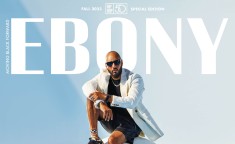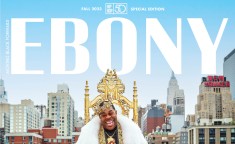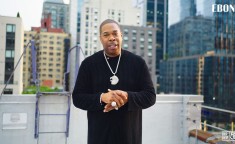There are striking similarities between 50 Cent and the genre of hip-hop. Both start from humble beginnings, representing communities marred by disenfranchisement and neglect, existing in spaces where opportunities are few but the will to defeat the odds is greater. The savviness learned on street corners became vital in infiltrating blue-chip corporations and capturing mainstream success. Doing it their own way—with no apology.
Although dressed casually in a crisp white T-shirt, black LA Dodgers baseball cap, and G-Unit jogging pants, there’s nothing simple about 50—especially his journey. “Hip-hop has completely changed my life and opened up doors that I didn’t even know I wanted to enter,” says 50 during our lengthy conversation as he prepared for “The Final Lap Tour,” a celebration of the twentieth anniversary of Get Rich or Die Tryin’.
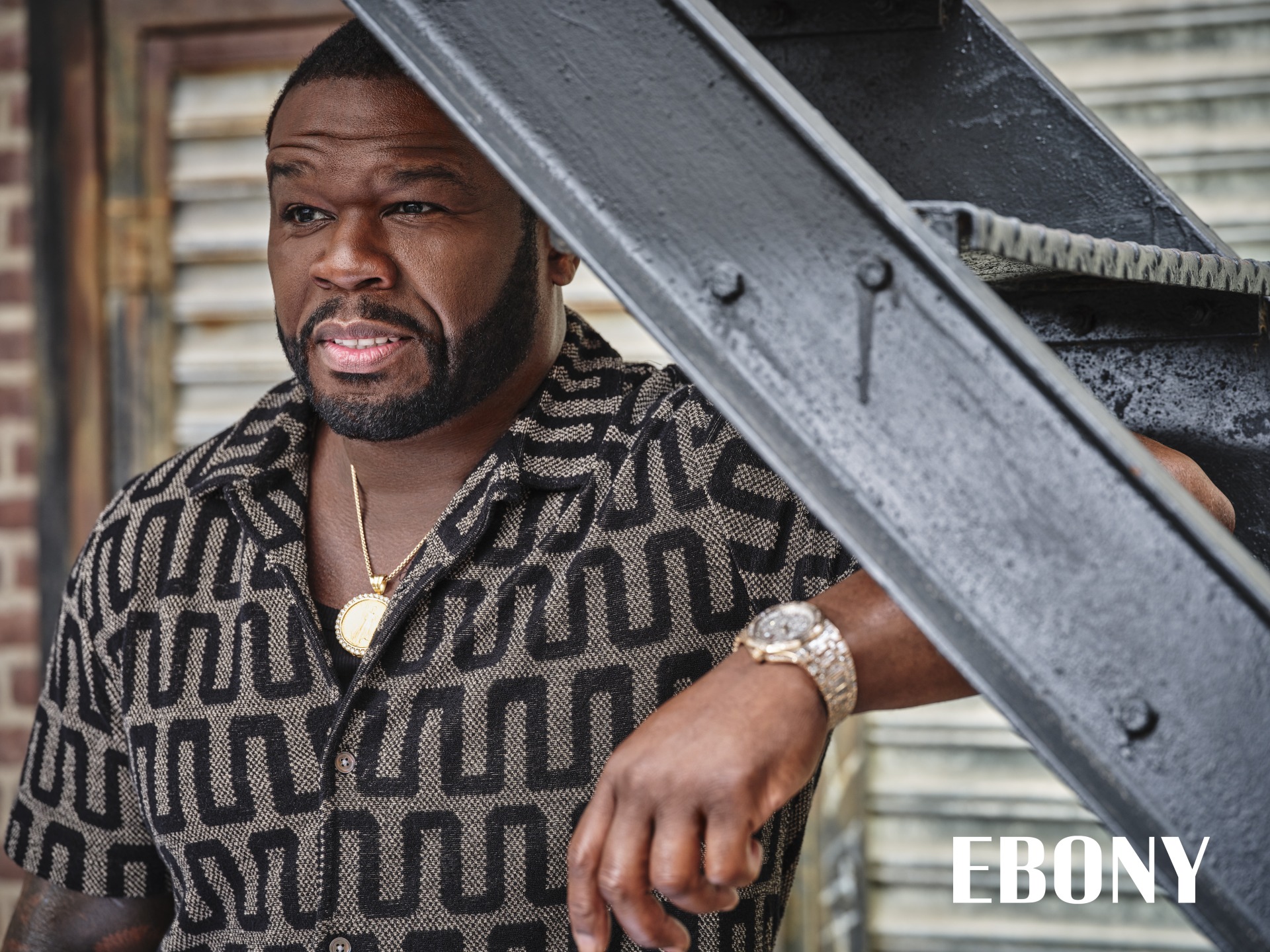
Todd Snyder Tile Terry Cabana Shirt. Jewelry, Stylist’s own. Photo by Keith Major for EBONY Media.
Arguably the most anticipated debut album in hip-hop history, Get Rich solidified 50 Cent as a music titan. Even with the pervasive gangster ethos and street talk, 50 views the album as aspirational, a title that awakens the notion of a higher standard of living by any means necessary. “After being shot nine times, it was always about being aspirational, getting to the money, and always being in a position to grow,” he admits.
In its fifty years of existence, hip-hop has played a role in numerous stories of triumph, but there may not be a more intriguing story in the culture than that of Curtis Jackson. The kid, once known as Boo Boo, grew up in South Jamaica, Queens, during the height of the turbulent crack cocaine era. He mastered the art of turning survival into success.
“After being shot nine times, it was always about being aspirational, getting to the money, and always being in a position to grow.”
-50 Cent
His skills served him well following his mother’s mysterious death when he was eight. He survived nine bullets to the body—in front of his grandmother’s home—at age twenty-five. And subsequently, his career remained intact after Columbia Records dropped him from its label following the violent attack on his life.
Indeed, experiencing such life-altering trials can either break you or prepare you for something bigger. For 50 Cent, “big” meant becoming the biggest freshman rapper of all time, a more prominent businessman with properties such as Vitaminwater (which was sold to Coca-Cola in 2007, subsequently making an estimated $100 million) and Sire Spirits, and with G-Unit Films & Television Inc., he has become one of this generation’s biggest TV/film producers.
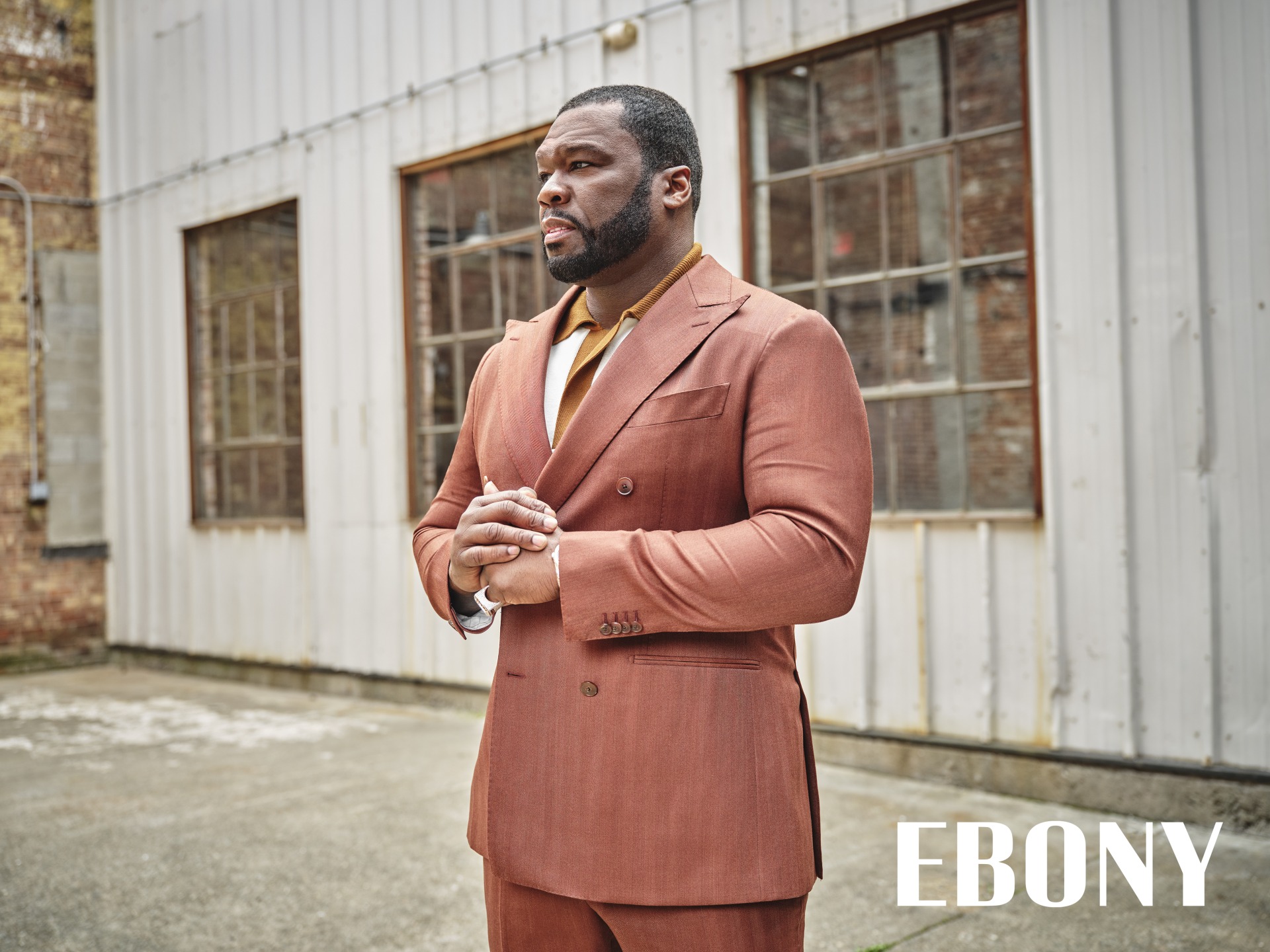
Suitsupply Herringbone Havana Suit. King & Tuckfield London Oversized Merino Wood Pullover. Photo by Keith Major for EBONY Media.
“With the popularity and finances that came from the success of hip-hop music, I was able to involve myself in all kinds of businesses, TV, and film,” 50 Cent says of his transition from rap king to business mogul and now TV/film producer.
But as hip-hop changed 50 Cent’s life, he also changed the dynamics of hip-hop business in more ways than one. Before releasing his massive-selling 2003 debut Get Rich or Die Tryin’, 50 Cent became the catalyst of the self-made mixtape movement. “Artists had to gain the right to be recognized by an A&R [person] who would help them get signed to a record contract,” 50 Cent says, discussing how artists were traditionally discovered by record labels.
“In my case, I had been dropped from Columbia Records. I got shot, and the phone stopped ringing.” So, he decided to do a mixtape, “50 Cent Is the Future.” Mixtapes were put out by DJs as collections of songs from different artists.
To read the rest of this cover story, pick up the Fall 2023 Hip-Hop 50 commemorative print edition of EBONY Magazine in partnership with Mass Appeal at magazines.com, Barnes & Noble, Walmart, Walgreens, Target, Publix, Safeway, Kroger, Books A Million, and more, plus select retailers in London and South Africa on September 19th.

Editor-in-Chief & SVP, Programming: Marielle Bobo
Creative Director: Rashida Morgan-Brown
Executive Producer: Tracey Woods
On-Set Producer: Michele Brea
Video Editing: Mega Media
Stylist: Rachel Johnson
Stylist Assistant: Khadija Martin
Tailor: Alberto Rivera
Groomer: Jessica Smalls
Photo Assistants: Cesar Rebollar, Nafsi, Nailea Dominguez
Digital Tech: Karl Ferguson Jr.





